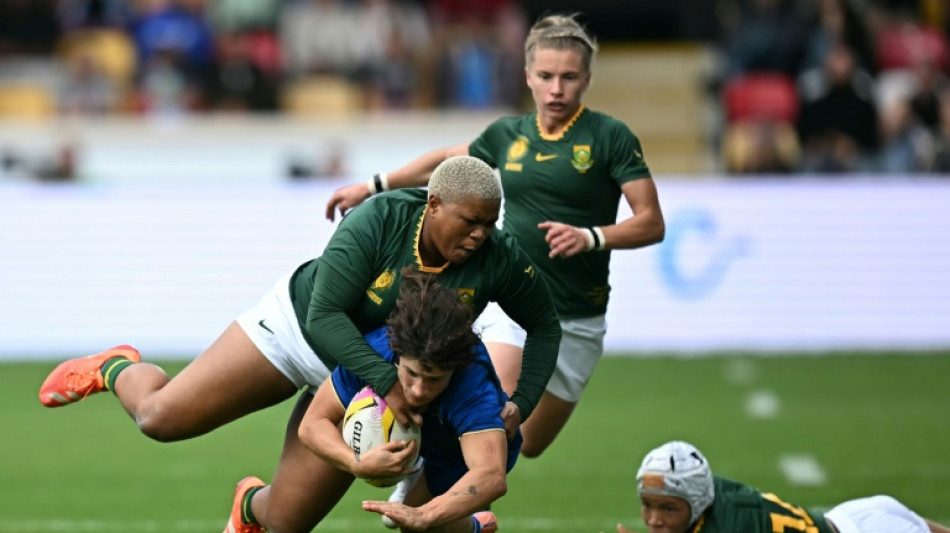

South Africa women's team step up to chase Springbok success
South Africa's women's team are stepping out from the monumental shadow of the four-time world champion Springboks as they prepare for their first-ever quarter-final appearance in a Rugby World Cup by taking on France this weekend.
The team has come a long way since disappearing between 2014 and 2017, drawing more attention as they develop though they still do not enjoy the public adoration reserved for the men's squad.
Under the guidance of coach Swys de Bruin, the Springbok Women take on France on Sunday in their final pool game after already having ensured a history-making spot in the quarter-finals following their battling 29-24 win against higher-ranked Italy in gameweek two.
"We are sitting on a goldmine that can explode if we're really serious about it," said former coach Stanley Raubenheimer, who led the team's revival from 2018 to 2022.
This success can be traced back to 2019, when, as SA Rugby Union director of rugby, current Springbok coach Rassie Erasmus made the women's side a priority.
It has paid off. Between 2021 and 2024, the pool of licenced players nearly doubled from 3,900 to 6,800, and the first professional women's franchise -- the Bulls Daisies -- was launched in 2023.
"There are a lot of plans for next year," De Bruin told AFP. "There will be more professional franchises, not only the Bulls."
De Bruin, a Springboks attack coach from 2018 to 2019, also helped to rebuild the men's side before resigning with burnout.
There are parallels between the men's and women's teams but "the gap is still massive", he said.
- Exposure, inspiration -
The Boks Women opened their World Cup campaign this year with a 66–6 rout of Brazil on August 24, their first World Cup pool stage win since 2010.
It was a massive moment for the team but went unnoticed by many at home.
In popular sports bars in Johannesburg, the game was on television but few were watching. "On Sundays, people rest," a security guard said at the Benchwarmers by way of explanation.
It was a far cry from the jubilation the day before when fans crowded venues across the city in gold and green jerseys to watch the Springboks exact a 30-22 revenge on Australia.
With history already made, Springbok Women prop Yonela Ngxingolo believes this World Cup run could turn the tide for the game.
"Definitely, because even the numbers have grown right now in terms of exposure and people seeing us," Ngxingolo told AFP.
That means "there are more girls out there that are going to be inspired", she added.
- 'In our DNA' -
Like the men, the women favour a bench stacked with six forwards and just two backs. "We pride ourselves on our physicality," said forwards coach Franzel September. "We know we can bully you up front. That's in our DNA."
Embodying this raw power is Aseza Hele, an unstoppable loose forward (172cm, 91 kg) and one of the Black players who ensures the women's team is more representative of South Africa than the largely white men's squad.
The composition of the country's sports teams is closely watched in the post-apartheid era and the Springboks were criticised for including only one Black player in the side that defeated Australia.
There was little chance of that happening in women's rugby as it was "more prevalent in the Black culture", Raubenheimer said.
"Girls really want to play rugby so there's not those blockers and barriers that you might have in other countries where girls don't know whether they want to play a contact sport," former Ireland international Lynne Cantwell, the team's high-performance manager until 2024, told AFP.
The South African "high school system is an absolutely unbelievably ripe breeding ground for excellent talent", she said, adding that she hopes "in the next couple of years that will get stronger and there'll be more schools getting involved and more competitive in the girls' game".
T.Yahya--CdE



